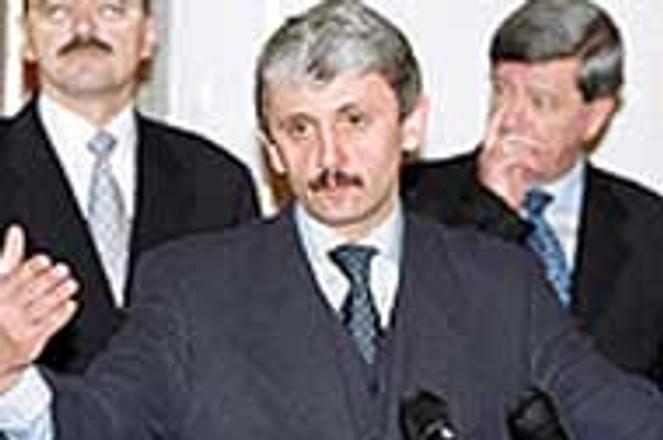Prime Minister Mikuláš Dzurinda details the long road to EU membership after coming home from December 11-12 Helsinki summit .photo: TASR
As a Christmas gift, the invitation to Slovakia to begin negotiations on entry to the European Union at an EU summit in Helsinki on December 11 left only one thing to be desired - a concrete date at which Slovakia might expect to become a member of the Union.
The assembled heads of state of the 15 EU member countries - known collectively as the European Council - invited Slovakia, along with Romania, Bulgaria, Lithuania, Latvia and Malta to begin entry negotiations with the EU, but said the date at which each country might join the group would depend on how quickly the prospective members could prepare for accession.
Preparation for EU entry, in turn, is a matter of how quickly each country can fulfill the 29 'chapters' of the acquis communautaire, a body of legal and adminstrative standards common to EU countries.
"Slovakia has divided all [29] negotiation chapters into four groups, ranging from the easiest to fulfill to the most difficult," said Slovakia's chief EU negotiator, Deputy Foreign Minister Ján Figeľ, on December 12. "We want to start in February next year with the easiest chapters where we are already more or less compatibile with the acquis."
Figeľ explained that the easy work would begin with areas such as small and medium-sized business, a common foreign and security policy and the fishing industry. The second group of chapters, Figeľ explained, should be ready the end of 2002, while the third and fourth blocks, including enviromental and energy policy, would require huge investments and thus more time to be enacted.
Prime Minister Mikuláš Dzurinda, for his part, said he hoped all 29 chapters could be readied by the beginning of 2003. Slovakia has said it wants to be admitted to the EU at the same time as its neighbours, the Czech Republic, Poland and Hungary, which began EU entry negotiations in April 1998.
EU officials said after the summit that Slovakia faced no barrier to early EU entry except its own readiness to meet the criteria. Luxemburg Prime Minister Jean-Claude Juncker, visiting Bratislava on December 15, said that "Slovakia's candidacy is in the hands of the Slovak people. It's up to them to meet standards of the Union."
According to Pawel Samecki, Poland's main EU negotiator, Slovakia's neighbours were anxious to see it join the union simultaneously. "Can you imagine the EU border running around Slovakia?" he asked. "It would be very expensive for us to guard it. It's one of many reasons we are supporting Slovakia."
But foreign policy professionals expressed doubt that Slovakia could make up for the ground it had lost to its neighbours, and said the predictions of politicians should not be trusted. Ivo Samson, an analyst with the Slovak Foreign Policy Association, said that "enlargement is more an issue for the economists and lawyers who must settle the details of entry requirements. Politicians have never given realistic entry dates, and I estimate that the first enlargement wave of three or four countries will occur around 2005."
Samson also warned that the interest of EU member countries in expansion could cool as the real costs became apparent. "There is a difference between NATO and EU integration," he said. "NATO is an agreement between neighbours to guard a common fence. But EU integration is like the Union giving the keys to their appartment to Slovakia. Therefore it will take some time."
Complicating matters in Slovakia's case may be the preparedness of lower-level state officials to handle the tasks of integration. Until now, the Slovak EU team has consisted of recognized professionals like Foreign Minister Eduard Kukan, Deputy Minister Figeľ and Deputy Prime Minister for European Integration Pavol Hamžík. According to Poland's Samecki, this Slovak trio worked very effectively in Brussels.
However, Samson was less optimistic about the capabilities of the junior Slovak state officials who will be handling the details of Slovakia's integration into the EU. "These people usually know nothing about EU integration or have just partial information. It will be a problem for Slovakia," Samson said.
While Slovak government officials exulted over the results of the Helsinki summit and tried to downplay concerns about the timing of entry, some opposition politicians were heard to say that the country could have actually begun negotiations long ago but for EU unwillingness.
Former Slovak Prime Minister Vladimír Mečiar said on December 12 on TV Markíza that the recent EU decision was not in fact due to the work of the current Slovak government. "We were ready for accession talks in 1997, but the EU didn't have sufficient capacities to invite more candidates," Mečiar said.
But Luxemburg's Juncker was there to argue. "I usually don't comment on the domestic problems of other countries, but I have to respond to this," Juncker said. "In 1997, the EU didn't want to say yes to Mečiar's government, nor did it want to say no to the Slovak people. Therefore we labeled Slovakia as a [EU] candidate country without starting accession talks."


